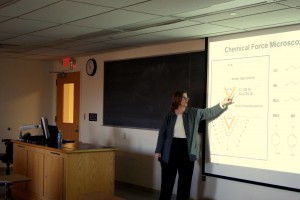By Sara Torres
Correspondent
The College’s chemistry department held a presentation on crystal engineering as a part of its fall seminar series on Wednesday, Nov. 28. The seminar, “A Material Chemist’s View of Crystal Deposition Disease,” was presented by Jennifer A. Swift, a chemistry professor at Georgetown University in Washington, D.C.

The seminar, attended by both students and staff, focused on an application of analytical chemistry, an area of science concerned with qualitative and quantitative examination of the chemical components of matter.
The presentation traced ways in which analytical chemistry could be used to research the formation of kidney stones and gout. It was also shown how examining molecular crystals can be applied in cases of crystal deposition disease. This disease causes pain, swelling and sometimes redness in joints.
Methods discussed throughout the presentation included optical microscopy, X-ray crystallography and in situ atomic force microscopy.
Swift said that her objective for the seminar was to present different applications of techniques in analytical chemistry using methods that students have some familiarity with, as well as introducing new methods.
A PowerPoint presentation covered topics such as uric acid precipitation, chemical force microscopy, adhesion trends and crystal growth mechanisms.
Swift discussed the technology of atomic force microscopy, which can give a topographical map of crystal molecules.
“We can watch in real time shots of what happens to that surface as its growing,” Swift said.
Kartik Rai, junior chemistry major, said he thought it was interesting how Swift showed how analytical chemistry can be applied to the research of disease.
“She was able to present a lot of information, and her research was pretty impressive and interesting,” Rai said.
Swift’s research has real-world applications that span the spectrum from kidney stones to explosives.
The professor taught courses in organic chemistry and food chemistry at Georgetown this semester. Her work with molecular crystals has applications to the medical, pharmaceutical and food-product industries. One course she taught focuses on examining the explosive components in rockets.
Her students are exposed to areas of chemistry and material science including X-ray crystallography physical characterization methods, atomic force microscopy, organic synthesis and computational modeling.






